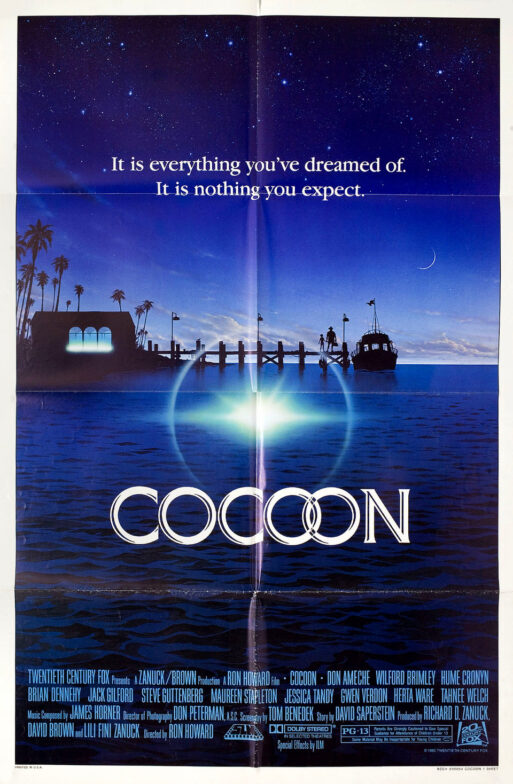 “Cocoon,” directed by Ron Howard, is a science fiction film that makes you ponder the value of life and the importance of death. The movie centers around a group of elderly residents at a retirement home who discover a transformative pool that revitalizes their aging bodies and spirits. This magical pool is tied to extraterrestrial cocoons stored there by visiting aliens. “Cocoon” weaves a narrative that is both whimsical and profound, offering a unique perspective on the concept of death and what might lie beyond it.
“Cocoon,” directed by Ron Howard, is a science fiction film that makes you ponder the value of life and the importance of death. The movie centers around a group of elderly residents at a retirement home who discover a transformative pool that revitalizes their aging bodies and spirits. This magical pool is tied to extraterrestrial cocoons stored there by visiting aliens. “Cocoon” weaves a narrative that is both whimsical and profound, offering a unique perspective on the concept of death and what might lie beyond it.
A Shocking Discovery
The film, released in 1985, begins with three elderly friends — Art Selwyn (Don Ameche), Ben Luckett (Wilford Brimley), and Joe Finley (Hume Cronyn) — sneaking into a nearby estate to swim in its pool. They soon notice that their physical ailments and age-related limitations start to fade away. Unbeknownst to them, the pool contains alien cocoons that have an extraordinary life-giving power. As the story progresses, it is revealed that these cocoons belong to a group of aliens who had come to Earth thousands of years ago from their home planet of Antarea. They were left behind when their mission failed. These aliens, led by Walter (Brian Dennehy), have returned to rescue their comrades and rejuvenate them using the pool’s mysterious energy.
The rejuvenation process in “Cocoon” gives its users a way to cheat the effects of aging and death. The elderly characters experience a resurgence of vitality, reminiscent of a second youth. It brings into question the inevitability of death and the possibility of eternal life, concepts that have fascinated humanity for centuries. The characters’ newfound energy allows them to reclaim their passions and dreams, but is there a cost?

Ron Howard on the set of “Cocoon.”
Credit: IMDB
The Inevitable Decisions
“Cocoon” is not merely a tale of miraculous physical renewal. It also delves deeper into the emotional and philosophical implications of life and death. As the elderly protagonists grapple with their revived bodies, they must also confront the reality of their existence and the inevitable loss of loved ones. Joe, for instance, faces the dilemma of leaving behind his wife, Alma (Jessica Tandy), who chooses not to use the pool’s powers.
The film also explores the idea of an afterlife through the perspective of the aliens. The extraterrestrials, who have transcended human mortality, offer an alternative view of existence beyond death. Their serene and compassionate demeanor suggests a more enlightened state of being. This portrayal aligns with various cultural and religious beliefs that depict the afterlife as a realm of peace and eternal life. By presenting the aliens as benevolent beings, “Cocoon” hints at the possibility that death might be a transition to a more advanced state of existence rather than a definitive end.
In the climactic moments of the film, the elderly characters are faced with a choice: to remain on Earth and continue their mortal lives or to leave with the aliens and embrace a new, immortal existence. But even with this immortality, they still face the loss of their loved ones who can’t join them. In this way, the movie reveals the inevitability of death, even if you’re “immune” to it.
“Cocoon” ultimately offers a hopeful and comforting perspective on death. It suggests that death is not an end but a transformation, a return to a state of purity and vitality. By blending science fiction with deeply human themes, “Cocoon” remains a poignant exploration of life’s ultimate mystery and the enduring hope for renewal beyond the grave.

 “Cocoon,” Directed by Ron Howard
“Cocoon,” Directed by Ron Howard


 National Donate Life Month Reminds Us To Give
National Donate Life Month Reminds Us To Give
 How Dare You Die Now!
How Dare You Die Now!
 Debating Medical Aid in Dying
Debating Medical Aid in Dying














